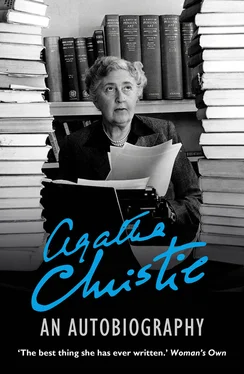Life seems to me to consist of three parts: the absorbing and usually enjoyable present which rushes on from minute to minute with fatal speed; the future, dim and uncertain, for which one can make any number of interesting plans, the wilder and more improbable the better, since–as nothing will turn out as you expect it to do–you might as well have the fun of planning anyway; and thirdly, the past, the memories and realities that are the bedrock of one’s present life, brought back suddenly by a scent, the shape of a hill, an old song–some triviality that makes one suddenly say ‘I remember…’ with a peculiar and quite unexplainable pleasure.
This is one of the compensations that age brings, and certainly a very enjoyable one–to remember.
Unfortunately you often wish not only to remember, but also to talk about what you remember. And this, you have to tell yourself repeatedly, is boring for other people. Why should they be interested in what, after all, is your life, not theirs? They do, occasionally, when young, accord to you a certain historical curiosity.
‘I suppose,’ a well-educated girl says with interest, ‘that you remember all about the Crimea?’
Rather hurt, I reply that I’m not quite as old as that. I also repudiate participation in the Indian Mutiny. But I admit to recollections of the Boer War–I should do, my brother fought in it.
The first memory that springs up in my mind is a clear picture of myself walking along the streets of Dinard on market day with my mother. A boy with a great basket of stuff cannons roughly into me, grazing my arm and nearly knocking me flat. It hurts. I begin to cry. I am, I think, about seven years old.
My mother, who likes stoic behaviour in public places, remonstrates with me.
‘Think,’ she says, ‘of our brave soldiers in South Africa.’
My answer is to bawl out: ‘I don’t want to be a brave soldier. I want to be a cowyard!’
What governs one’s choice of memories? Life is like sitting in a cinema. Flick! Here am I, a child eating éclairs on my birthday. Flick!
Two years have passed and I am sitting on my grandmother’s lap, being solemnly trussed up as a chicken just arrived from Mr Whiteley’s, and almost hysterical with the wit of the joke.
Just moments–and in between long empty spaces of months or even years. Where was one then? It brings home to one Peer Gynt’s question:
‘Where was I, myself, the whole man, the true man?’
We never know the whole man, though sometimes, in quick flashes, we know the true man. I think, myself, that one’s memories represent those moments which, insignificant as they may seem, nevertheless represent the inner self and oneself as most really oneself.
I am today the same person as that solemn little girl with pale flaxen sausage-curls. The house in which the spirit dwells, grows, develops instincts and tastes and emotions and intellectual capacities, but I myself, the true Agatha, am the same. I do not know the whole Agatha.
The whole Agatha, so I believe, is known only to God.
So there we are, all of us, little Agatha Miller, and big Agatha Miller, and Agatha Christie and Agatha Mallowan proceeding on our way-where? That one doesn’t know–which, of course, makes life exciting. I have always thought life exciting and I still do.
Because one knows so little of it–only one’s own tiny part–one is like an actor who has a few lines to say in Act I. He has a type-written script with his cues, and that is all he can know. He hasn’t read the play. Why should he? His but to say ‘The telephone is out of order, Madam’ and then retire into obscurity.
But when the curtain goes up on the day of performance, he will hear the play through, and he will be there to line up with the rest, and take his call.
To be part of something one doesn’t in the least understand is, I think, one of the most intriguing things about life.
I like living. I have sometimes been wildly despairing, acutely miserable, racked with sorrow, but through it all I still know quite certainly that just to be alive is a grand thing.
So what I plan to do is to enjoy the pleasures of memory–not hurrying myself-writing a few pages from time to time. It is a task that will probably go on for years. But why do I call it a task? It is an indulgence.
I once saw an old Chinese scroll that I loved. It featured an old man sitting under a tree playing cat’s cradle. It was called ‘Old Man enjoying the pleasures of Idleness.’ I’ve never forgotten it.
So having settled that I’m going to enjoy myself, I had better, perhaps, begin. And though I don’t expect to be able to keep up chronological continuity, I can at least try to begin at the beginning.
Конец ознакомительного фрагмента.
Текст предоставлен ООО «ЛитРес».
Прочитайте эту книгу целиком, купив полную легальную версию на ЛитРес.
Безопасно оплатить книгу можно банковской картой Visa, MasterCard, Maestro, со счета мобильного телефона, с платежного терминала, в салоне МТС или Связной, через PayPal, WebMoney, Яндекс.Деньги, QIWI Кошелек, бонусными картами или другим удобным Вам способом.












